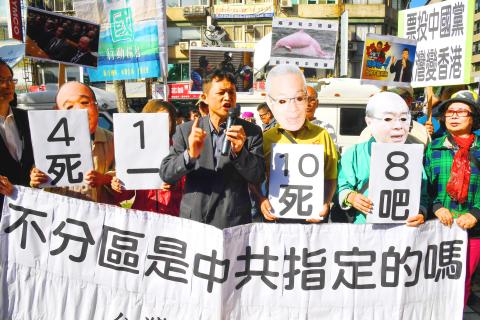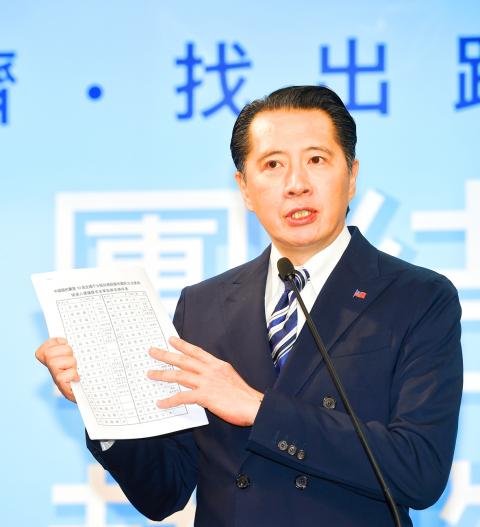The Chinese Nationalist Party (KMT) yesterday published its revised list of legislator-at-large nominees following a provisional KMT Central Standing Committee meeting.
The party convened the meeting after the initial list, which was approved by the committee at a meeting on Wednesday and included former KMT legislator Chiu Yi (邱毅) and retired lieutenant general Wu Sz-huai (吳斯懷), was met with broad criticism.
Chiu was a controversial pick because of questions about his loyalty to Taiwan, while Wu was criticized for attending an event celebrating the 150th anniversary of Sun Yat-sen’s (孫逸仙) birth in Beijing in 2016 and standing for the Chinese national anthem.

Photo: CNA
Chiu yesterday said on Facebook that he would withdraw his name from the list if its inclusion made some party members unhappy.
Before the meeting, KMT Vice Chairman Hau Lung-bin (郝龍斌) said he felt that KMT Chairman Wu Den-yih (吳敦義), who was 10th in the original list, should remove himself from it.
He also told Wu Den-yih during the meeting.

Photo: Fang Pin-chao, Taipei Times
The revised list saw retired National Police University associate professor Yeh Yu-lan (葉毓蘭), originally in first, switch places with KMT Legislator William Tseng (曾銘宗), who was initially second.
Chiu was removed from the list and replaced by former Mainland Affairs Council deputy minister Chang Hsien-yao (張顯耀), who was placed 17th.
Wu Den-yih was lowered to 14th, while Wu Sz-huai remained in fourth.
Former Presidential Office spokesman Charles Chen (陳以信) was moved up from 16th to 10th, while KMT Central Standing Committee member Lee Te-wei (李德維), considered a member of former vice president Lien Chan’s (連戰) inner circle in the party, was moved from 18th to 12th.
Asked about the controversy surrounding Wu Sz-huai, Wu Den-yih said that the retired general “had cause to attend the ceremony,” as Sun is not only the “nation’s father,” but also one of the founders of the KMT.
An unnamed source said that Wu Den-yih had previously leaned toward replacing Wu Sz-huai with former Ministry of National Defense spokesman David Lo (羅紹和), but was forced to drop the idea, as Lo did not hold sufficient weight in the military and Wu Sz-huai is president of the 800 Heroes for the Republic of China Association, a group opposed to pension reform that has the backing of military-affiliated organizations.
Asked whether the KMT cares about how the public regards the party, KMT spokesman Ouyang Lung (歐陽龍) said that adjusting its list of nominees was taking the public’s perception into account.
Meanwhile, Yeh defended her remark that young protesters in Hong Kong were “rioters seeing red,” saying that as an academic of police administration, she must support police forces in other nations and the concept of the rule of law.
“You cannot set things alight behind a mask just because you are young or a student,” Yeh said.
Regarding online rumors that she had received money from China, Yeh said that she has never taken a cent from China, adding that over the past two decades, the Republic of China national flag has featured prominently on business cards she has given to Chinese officials.

Right-wing political scientist Laura Fernandez on Sunday won Costa Rica’s presidential election by a landslide, after promising to crack down on rising violence linked to the cocaine trade. Fernandez’s nearest rival, economist Alvaro Ramos, conceded defeat as results showed the ruling party far exceeding the threshold of 40 percent needed to avoid a runoff. With 94 percent of polling stations counted, the political heir of outgoing Costa Rican President Rodrigo Chaves had captured 48.3 percent of the vote compared with Ramos’ 33.4 percent, the Supreme Electoral Tribunal said. As soon as the first results were announced, members of Fernandez’s Sovereign People’s Party

MORE RESPONSIBILITY: Draftees would be expected to fight alongside professional soldiers, likely requiring the transformation of some training brigades into combat units The armed forces are to start incorporating new conscripts into combined arms brigades this year to enhance combat readiness, the Executive Yuan’s latest policy report said. The new policy would affect Taiwanese men entering the military for their compulsory service, which was extended to one year under reforms by then-president Tsai Ing-wen (蔡英文) in 2022. The conscripts would be trained to operate machine guns, uncrewed aerial vehicles, anti-tank guided missile launchers and Stinger air defense systems, the report said, adding that the basic training would be lengthened to eight weeks. After basic training, conscripts would be sorted into infantry battalions that would take

GROWING AMBITIONS: The scale and tempo of the operations show that the Strait has become the core theater for China to expand its security interests, the report said Chinese military aircraft incursions around Taiwan have surged nearly 15-fold over the past five years, according to a report released yesterday by the Democratic Progressive Party’s (DPP) Department of China Affairs. Sorties in the Taiwan Strait were previously irregular, totaling 380 in 2020, but have since evolved into routine operations, the report showed. “This demonstrates that the Taiwan Strait has become both the starting point and testing ground for Beijing’s expansionist ambitions,” it said. Driven by military expansionism, China is systematically pursuing actions aimed at altering the regional “status quo,” the department said, adding that Taiwan represents the most critical link in China’s

EMERGING FIELDS: The Chinese president said that the two countries would explore cooperation in green technology, the digital economy and artificial intelligence Chinese President Xi Jinping (習近平) yesterday called for an “equal and orderly multipolar world” in the face of “unilateral bullying,” in an apparent jab at the US. Xi was speaking during talks in Beijing with Uruguayan President Yamandu Orsi, the first South American leader to visit China since US special forces captured then-Venezuelan president Nicolas Maduro last month — an operation that Beijing condemned as a violation of sovereignty. Orsi follows a slew of leaders to have visited China seeking to boost ties with the world’s second-largest economy to hedge against US President Donald Trump’s increasingly unpredictable administration. “The international situation is fraught